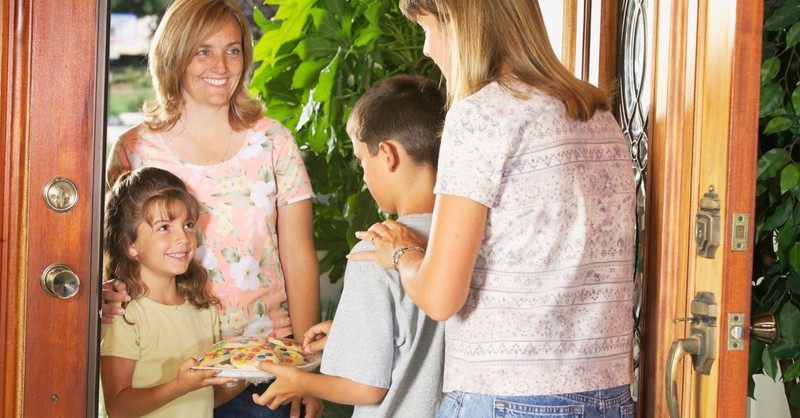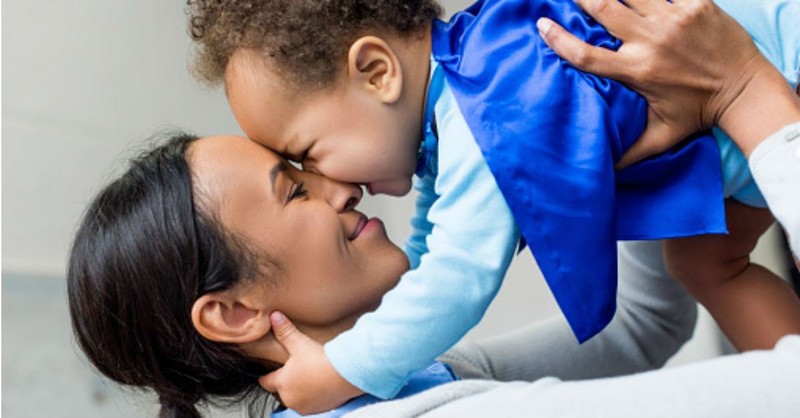
From the moment children are born, they need relationship to grow. Babies and young children are wired to learn and develop through interacting with and watching others, and as parents, our job is to guide and support healthy relationships where our children can flourish.
God created us to be in relationships. When He made Adam, He did not say, "it is good" as he did with all the previous creations. Instead, God noticed, "It is not good for the man to be alone" (Genesis 2:18). So, he made Adam a mate. Out of His love for us, he created us for relationships.
Why do children need relationships, even as small children? Healthy relationships help our children learn how to interact and care for others, while also building confidence and assurance. Science supports the parental intuition that positive, trusting relationships help children to "perform better in school, have more positive relationships with peers and adults, and have more positive emotional adjustment and mental health."
I asked several of my godly parent friends what relationships they felt were essential to their children. Here are the 7 most important relationships they shared:
Photo Credit: Unaplsh/Limor Zellermayer

1. Parents
Parents may be an obvious relationship, but we sometimes forget that parenting goes far beyond merely providing for the needs of our children. Children’s relationships with their parents shape how they see themselves. It is the parental relationship where they learn they are loved and wanted. Children may inherit parents’ genetic makeup, but the trajectory of their lives are influenced more by their parental relationships than any other.
The model for an ideal parenting relationship is our Heavenly Father. We need only turn to Scripture for His example.“But you, Lord, are a compassionate and gracious God, slow to anger, abounding in love, and faithfulness”(Psalm 86:15). “He is kind and compassionate (Psalm 145:8). God is merciful and forgives His children (Daniel 9:9), and He disciplines out of love. “Whoever spares the rod hates their children, but the one who loves their children is careful to discipline them” (Proverbs 13:24).
Scripture assures us that our efforts as godly parents will not be in vain. “Start children off on the way they should go, and even when they are old, they will not turn from it” (Proverbs 22:6). Which path do we want our children to take?
Photo Credit: Getty Images/Light Field Studios

2. Siblings
Not every child has a sibling, but the Bible shows us that believers are invited into relationships that are akin to brother or sisterhood.
Where we do see sibling relationships in Scripture, they were often strained. With Cain and Abel, Joseph and his eleven brothers, and Esau and Jacob, we see family dysfunction abounds. Family rivalry is not God's plan; instead, we are called to be peacemakers and live in unity, as we are called to do with our spiritual brothers and sisters.
In addition to learning to live in unity, healthy sibling relationships are meaningful because the family we grow up in is the basis for future family relationships. What children learn about living with family as a child manifests in the family relationships they form through marriage and building families of their own.
To support the relationship between brothers and sisters, avoid favoritism. God does not show partiality; He loves everyone with equal measure. Each child is different and possesses individual strengths and weaknesses, and some children are easier to parent than others, but by doting on one child over another, resentment and distrust is bred. Consider how Joseph's brothers responded to favoritism, “When his brothers saw that their father loved him more than any of them, they hated him and could not speak a kind word to him” (Genesis 37:4).
Instead, parents should foster in sibling relationships kindness, patience, and forgiveness, which binds families together. One of the enemy's primary tactics is dividing families, but as Christ-followers, we are called to live in unity, peace, and acceptance.“Let us, therefore, make every effort to do what leads to peace and to mutual edification” (Romans 14:19). By promoting strong, loving sibling relationships, we teach our children to be peacemakers, not rivals.
Photo Credit: Unsplash

3. Friends
Friendships are important because they teach children about the Golden Rule from Matthew 7:12, “So in everything, do to others what you would have them do to you, for this sums up the Law and the Prophets” (Matthew 7:12). Through friends, children learn about the give and take of relationships. They learn about who they are and what they like. Friendships foster selfless sharing and emotional strength. From preschool through adulthood, friendships help us experience new things, see people as individuals, and understand how to interact.
How can we support our children's friendships? By creating a safe and inviting environment for our children and their friends to play and learn. Encourage kind behavior and listen to your child when they talk about their friends. Is it positive and fun? Or sad and discouraging? Make adjustments if necessary and teach children how to respond. Young kids expect something in return when they give something. Encourage children to do things for their friends without expecting something in return. Teach that everyone is not the same in appearance or likes and dislikes, but everyone is important. Friends help children see others as valuable and discover that he or she is important as well.
Photo Credit: Getty Images/Ridofranz

4. Neighbors
When families move away from their hometowns and separate from grandparents and extended family, neighbors often become adopted families. Since neighbors come from different backgrounds and cultures than our immediate families, these relationships present an opportunity to teach children the meaning of "loving our neighbor." Jesus teaches that after loving God with all our heart, mind and soul, the second greatest commandment is to “Love your neighbor as yourself” (Mark 12:31, Matthew 22:36-40). In Luke 10, Jesus tells the parable of the Good Samaritan, which shows us that the definition of "neighbor" is anyone in need.
To promote relationships with neighbors, and help them learn the value of loving our neighbors, encourage older children to offer help when they see an opportunity. They might carry groceries, mow yards, or drop off food or a cheerful card for sick neighbors. Also, keep in mind, children learn most often by example. Your interaction with your neighbors is the model they will follow. Usually, when we teach and model neighborly love, our neighbors love our families back.
Photo Credit: Getty Images/Brand X Pictures

5. Future Spouse
It may feel as if thinking about who our child will marry in twenty years is premature, but keep in mind their spouse will be one of the most important earthly relationships after their parents. God designed us to mature and leave our parents and be joined in marriage (Genesis 2:24). So, now is the time to prepare our children for that relationship.
You can begin that preparation by praying for the spouse God has already chosen for your child, and in the meantime, model a godly marriage. We can model a godly marriage by showing kindness, gentleness, and forgiveness toward our spouse. We can also help our children understand that all marriages are not perfect and do not always look like those in movies and television. Some days marriage is beautiful when it's going right and sometimes it’s messy. We should also speak kind words to our spouse, showing respect at all times. Let children see us doing marriage well, and in the future, they will model the same.
Photo Credit: Getty Images

6. Their Future Children
It may seem odd to consider the relationship between your children and their future children, but as parents, we shape the parents our children become. Now is the time to begin teaching our children how to depend on God for sound parenting.
As Moses was about to hand over leadership to Joshua, he instructed the people of Israel how to live prosperously in the Promised Land. Along with obeying the law and writing Scripture on their hearts, Moses told parents to impress upon their children God's law. “You shall teach them to your children, talking of them when you are sitting in your house, and when you are walking by the way, and when you lie down, and when you rise.” (Deuteronomy 11:19)
By obeying this command, the children of the Israelites would be surrounded by God's word. As we parent, we are to do the same--teach our children the ways of our Heavenly Father so they will do the same for their future children. The parenting we model becomes the way our children will parent.
Photo Credit: Getty Images/Light Field Studios

7. Our Savior
Some children will not experience all of the relationships listed here, and God's plan may include other earthly relationships, but the most important relationship in the life of every child is Jesus. Children were important to Jesus, and it's never too early to begin introducing our sons and daughters to His love. Several times in Scripture, we find Jesus surrounded by children. In Matthew 18, when asked who is the greatest in the kingdom, Jesus replied, “whoever takes the lowly position of this child is the greatest in the kingdom of heaven” (Matthew 18:4). Parents, let's begin teaching children early how much they are loved and treasured by Our Savior.
Out of His faithful love, God gifted us with relationships: first, a relationship with Him and then with others. As earthly parents, our job is to support and encourage our children to have friendships, kinships and if God wills it, be married and have children of their own. This is the gift of love entrusted to us by Our Heavenly Father for us to pass on to our children.

Tamela Turbevillehas a desire for every woman with a difficult past to know God loves them. She is wife to Richard, and mother to three grown sons and two beautiful daughter-in-law. When doing what she loves most-- studying God’s Word, reading and writing--she is surrounded by her six rescue dogs in her small office in south Arkansas. She began Living One Word to write and share how God redeems the unlovable and you can read more about Tamela, her journey, and her family at www.livingoneword.com, on Facebook, and Instagram.
Photo Credit: Getty Images/Pugun Photo
Originally published Monday, 24 June 2019.








